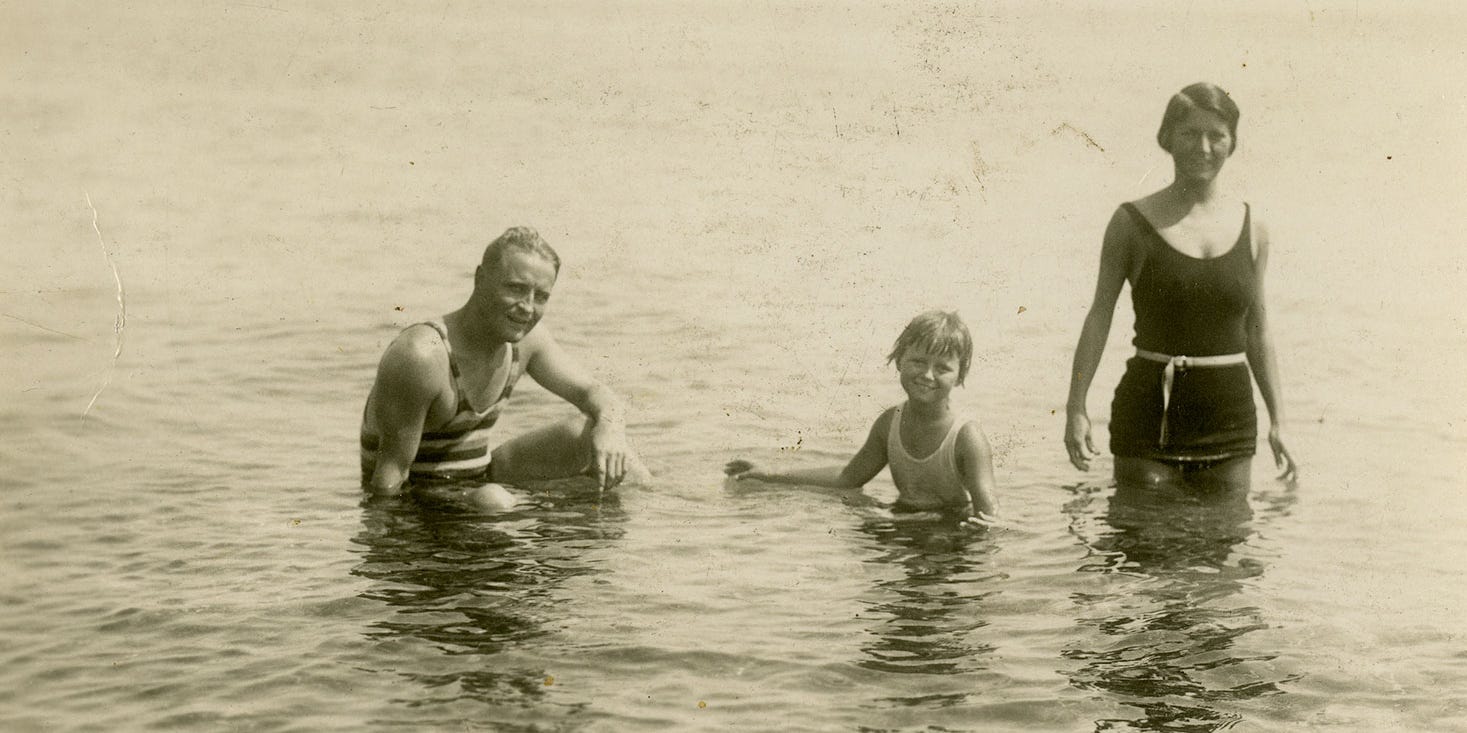✍️ How Do You Sell Your Ragged Heart?
or, Tricks for Finding the Price You Need to Pay to Write

“I’m afraid the price for doing professional work is a good deal higher than you are prepared to pay at present.”
That was F. Scott Fitzgerald in a letter to his then-teenage daughter about a piece she sent to him for review. Fitzgerald was always encouraging of Scottie’s writing, though maybe a little more “honest” in his appraisals than I might be. But in this, he’s not wrong – you do have to bare yourself.
This is certainly something I struggle with. I’ve been taught by my British upbringing that boys don’t cry, stiff upper lip, keep calm and carry on.
I don’t know how I feel about that.
It might sound like an attempt at a joke, but it’s not. I’ve been conditioned to not know how I feel. And, if somehow I do know, I’ve been further conditioned not to talk about it. Push it down with a cup of tea (or pint of Newcastle) and a slice of shepherd’s pie, then go about your day.
This is my life. This is my... well, maybe not deepest truth. But it’s one of the truths that until recently I haven’t been readily willing to share. Today, I force myself to dig into these, to learn the tools I need to connect to my emotions. It hasn’t been easy. I can’t, as Fitzgerald said, put down words “still bleeding” from the experience. I do not have that capacity. Not yet, in any case. I’m working on it.
Maybe some of you out there relate to this. If not this particular circumstance directly, I do know that many people have trouble putting their dark secrets down on paper for other reasons. Our insecurities and fears make it difficult to write our deepest truths.
But it’s not impossible.
Deep Truths Mean Deep Insecurities...
We are scared of writing “our truth”. We wonder what people will think of us when we put our most ragged thoughts down on paper. Yet, ragged is what the reader demands. “You’ve got to sell your heart, your strongest reactions, not the little minor things that only touch you lightly, the little experiences that you might tell at dinner,” Fitzgerald continues in the same letter from above.
It doesn’t help that I tend to be an intellectual reader and writer. At a recent writing retreat, we were asked to bring a piece of writing that moved us. I chose some of my favourite passages, but realized they excited me, engaged me intellectually, but didn’t necessarily move me emotionally. (What exactly does that mean, anyway? Sprechen sie English?) I did finally find one – from AA Milne’s autobiography, where he’s going all “Cat’s in the Cradle” about Christopher Robin.
Still doesn’t mean I know how to write that, though.
Here are a few of the things I’ve been doing to help me dig out those ragged truths from wherever they’re hiding inside of me.
How to Hit Bone and Show the Pain
Read What You Want to Write
When I want to write emotionally, I read some emotional writing. Like that AA Milne passage. It’s kind of like an emotional writing prompt – this is how you write sadness; this is how you write pain. It primes me up and puts me in that mood. It helps me get into the rhythm of that writing.
Listen to Music
I will listen to metal when I want a crazy scene, wistful when I want wistful, depressing when I… you get the picture. I know others do this, too. Listen before or during. (Listening after is pleasant, too, but likely won’t help your writing.)
Understand Your Emotions and the Role They Play
I confused my family one Christmas when I put “Atlas of the Heart” on my wish list. Definitely not a typical request from Dad (and they’ve seen some off-the-wall wishes). But the book was a huge help – as was the subsequent HBO special (currently it’s on Crave in Canada). For me, reading emotions is a little like, well, reading. I need to “sound out” the feelings and identify what each one looks like and means. I have a long way to go, learning this language. But if I can figure out what I’m feeling and why I’m feeling it and how I’m reacting to those feelings, it will at least help me put more emotion into my writing.
Read How to Do It
Cards on the table: I’ve looked for books, but haven’t actually read any yet. As I’m writing this, I’m wondering why this is so, and why I shouldn’t correct it right now. Apparently, The Emotional Craft of Fiction by Donald Maass is a good one, as Karen Hugg details here. In any case, books are out there – as are some YouTube videos.
Workshop How to Do It
I recently found out that long-time To Write with Wild Abandon reader Meg Oolders (Stock Fiction, Fictionistas) will be presenting an online workshop in September 2024 on how to give your reader an emotional reason to care about your story. You can learn more about it here: https://www.retreatwest.co.uk/short-story-festival I’m hoping to be there myself!
Have Fun
This one I’ve been deeply aware of for a while now. It’s basically the slogan of this Substack…
Jeannine Ouellette writes in her Substack, Writing in the Dark, that learning to be freer and more open in her writing was a major turning point for her.
“My writing began waking up almost immediately in all kinds of exciting ways. First, I laughed more than I had in years. I entered into what the comedic actor and creative genius John Cleese heralds as the most essential condition for creativity—“open mode”—a loose, playful state of mind most easily achieved through laughter. Second, and this is related to the laughing, I learned invaluable craft lessons, including the paradox that if I wanted to write dark and serious things, I needed to lighten up. I needed to play.” (Emphasis mine.)
I’ve talked about the role of play in creativity before. This is slightly different. This is the role of play in baring your soul. I think it’s kind of an “in vino veritas” sitch – except that your inhibitions drop because you’re drunk on fun, not wine. Besides, writing about painful things can be painful in itself. If I focus on the joy of getting the exact right words down rather than the pain of the experience, I am much more likely to get it written.
Key Takeaway: Putting down our deepest, most ragged thoughts and feelings is difficult. But it’s also necessary to pique the reader’s interest. Reading similar passages, listening to mood-inducing music, reading books/watching YouTube videos, and having fun all help.
Over to You: How Easily Can You Reach Your Ragged Emotions?
Where do you stick the needle to extract the marrow of your deepest truths? Any other tips you can give for opening up the ragged thoughts and emotions? I personally could use some! Let us all know in the comments below.
In the meantime, I’ll leave you an excellent biography of Fitzgerald. Scroll down for the documentary below.
Until next time, keep writing with wild abandon!
~Graham
email me if you get lost.





I love it Graham! I was one of these emotionally constipated people. I could not even understand what the word feeling meant. I could analyse everything very nicely but I was not doing emotions. Here are some of the tools that really helped me: tapping meditation, journaling (hello old friend!), microdosing psilocybin, guided meditation, energy work, havening, psilocybin journeys, visualization. Feeling safe enough is step one to reconnect with your emotions. Overthinking is a protection mechanism.
Boy, I’ve been thinking about this one all day Graham … and maybe because it’s because I’m so reluctant to “access my feelings,” to “tap into my deeper emotions” (I’m not quoting you, really, so much as my caricature of what you’ve written). In truth, even using those phrases makes me a bit uncomfortable. If I were being completely unguarded … which I guess I am … I’d say, what is the point in wallowing around in one’s emotions? What makes that so special? And why isn’t holding one’s emotions in check itself a way of accessing feelings, even if it is a kind of distrust of feelings? I think there are people who “access their feelings” fairly well in writing. Meg Oolders, who you mentioned, is one of them. But is that way of writing any better than that of someone who holds their feelings at arm’s length? I’m asking a bunch of argumentative questions, but it’s mostly because when I try to “plumb the depths” of my feelings, I end up writing the way I already do! I’m not sure there is some deeper or more emotive well that I’m reluctant to access.
As always, my greatest respect and esteem for the way you make me think.